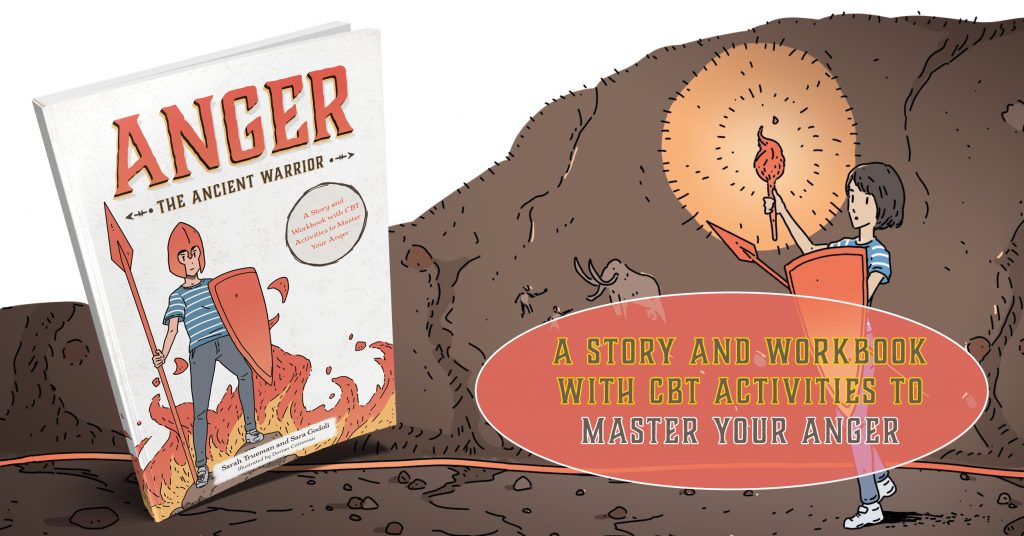
Sara Godoli, Integrative Psychotherapist in private practice, a social prescribing link worker for MIND and the NHS and a parent has teamed up with Sarah Trueman, children’s writer, commercial copywriter and parent to create ‘Anger the Ancient Warrior’ a book that challenges the perception of anger, helping children manage big feelings.
In the public sphere anger can act as a powerful force, shaking loose entrenched assumptions, sparking conversations and catalysing real change.
But if political anger can be seen as a vital part of a functioning state, it feels like a different story when you have to endure a temper tantrum from a ten-year-old who has been asked to turn off Fortnite. Personal anger is far less accepted. Instead, we treat it as something bad or shameful.
Yet, anger is a natural emotion, a boundary setter, a way for each of us to protect ourselves when we feel under attack. Mahatma Gandhi used to say: “Use your anger wisely. Let it help you find solutions of love and truth”.
But is there a way to harness anger’s energy to serve us, without letting it rage uncontrollably and become the force for pain we’re fearful of?
That’s the challenge taken up by Sara Godoli and Sarah Trueman, a psychotherapist and a children’s writer, in Anger the Ancient Warrior. Aimed at eight to twelve year olds, the book invites children to ‘master’ anger, rather than suppress it. The thinking: when children understand their anger, they can learn what the emotions are that lie behind it – use its fire to illuminate, not destroy.
Light in a dark time
It’s a refreshingly different approach. A quick read through the titles of earlier books for children on anger feature ‘cranky’, ‘mad’ and ‘grumpy’ characters who invite us to ‘overcome’, ‘tame’ or ‘put out the fire’ of our anger. Few titles suggest children, or parents, might try to understand their anger.
It’s also timely. Covid-19 has forced many of us to confront our own anger, as well as our children’s. Confinement, the stress of altered working conditions, job losses, and lack of personal space have made our households a tinder box for angry outbursts.
A recent study of 10,000 families in the UK by Professor Cathy Creswell, of the University of Oxford, reported significant increases in behavioural and emotional problems – tantrums and disobedience – for children aged four to 10 as a result of lockdown.
Sara Godoli, the psychotherapist half of the writing duo, says, “Writing this book in pre-Covid times, we could never have predicted just how necessary and relevant the timing of its launch would be. It’s little surprise our children are angry right now. It is a confusing time for us all. Living together in lockdown presents a hard challenge – and an opportunity – to get to know each other’s anger, away from the busyness of life.
We hope Anger the Ancient Warrior offers a fresh approach, without judgement, equipping children with a new perspective and the tools which will enable them to reflect on their anger. Showing children how to become observers of their own angry behaviour is an important step in teaching them to understand their emotions and learn new ways to communicate them. We’ve written it as a story and a workbook with CBT activities, because we hope Anger the Ancient Warrior will become a guide to show children how it is possible to master their anger and stop it causing unnecessary pain.”
A story and a how-to guide
Psychotherapists often talk about modelling ‘healthy anger’. Parents who formed their own complex relationships with anger when they were growing up may struggle to know what ‘healthy anger’ looks like. The book can help them explore that question with their children. One of its strengths is that it invites not only the child but also their carers to engage with and confront their own journey with anger.
“I found even bringing up the topic of anger with my ten year old would send him into a shameful rage,” says one mum. “But Anger the Ancient Warrior changed that. I think the brilliant illustrations helped. The book reached my son in a way previous attempts had failed to do. By telling my son his anger wasn’t shameful or bad it allowed him to be open to understanding what was going on emotionally. The result – he gets less angry. Sure, there are still moments when his anger rages, but we both came to understand our anger more, mine as well as his. It was an enormous learning curve for us both. I feel immense gratitude to Anger the Ancient Warrior for helping us both with that process.”
Jill Walkinton, a BBC Educational Consultant and experienced SEN teacher, sees similar benefits in a school setting. “Exploring anger through the Ancient Warrior is a child-friendly and helpful way to understand this volatile and sometimes frightening emotion,” she says. “In a school setting, this book will be of enormous help for children, teachers and counsellors, offering an unthreatening way into a difficult and highly personal topic. The possible solutions and suggested vocabulary could quickly become a short-hand between adult and child and even help prevent outbursts by a mutual understanding of the root cause.”
Whether in school or at home, Anger the Ancient Warrior should spark constructive personal conversations about anger.